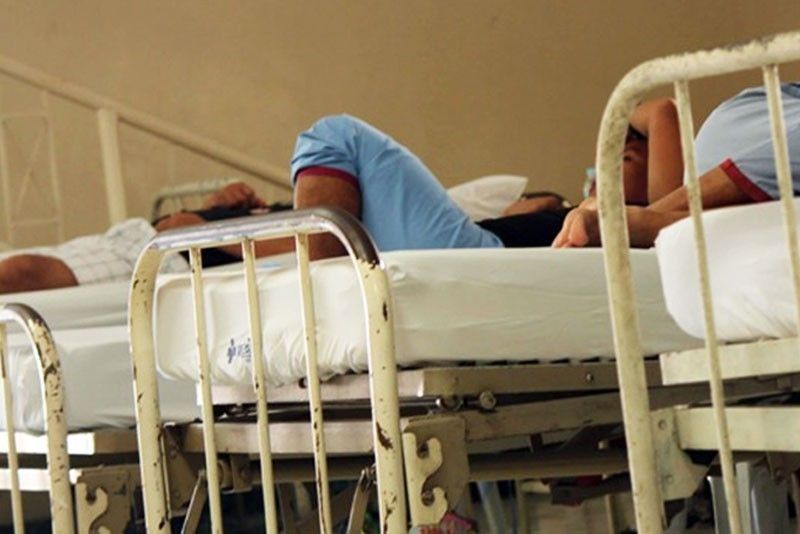PhilHealth’s P90-B excess funds face Senate scrutiny

PHILIPPINE Health Insurance Corp. (PhilHealth) may need to justify its plea for a bigger budget next year after declaring P89.9 billion as excess funds, while millions of poor Filipinos find it hard to pay their medical bills, according to a senator.
“[It is] not a private corporation, and [it] needs to answer to those hospitalized and those who can’t pay for their medical expenses,” Senator Joseph Victor “JV” G. Ejercito told a news briefing in Filipino on Wednesday. “They have to tell us why they are still asking for subsidies after declaring a lot of savings.”
This comes after the Supreme Court (SC) on Tuesday blocked the transfer of P29.9 billion — the last tranche of PhilHealth’s P90 billion in excess funds — to the national Treasury.
In a statement, the high court’s Public Information Office said the injunction was effective immediately. Oral arguments for three consolidated lawsuits challenging the transfer was set for Jan. 14. A copy of the injunction order had yet to be published.
The Senate is set to start plenary debates on next year’s proposed P6.352-trillion national budget on Nov. 9. It seeks to approve the spending plan by the second week of December at the latest.
Finance Secretary Ralph G. Recto in a statement on Tuesday said his agency would comply the tribunal’s order.
The excess PhilHealth funds would have been used to support unprogrammed appropriations worth P203.1 billion, which would support state health, infrastructure and social service programs.
“While PhilHealth has made strides in enhancing its benefit packages, significant gaps in our healthcare overage still exist,” Senator Pilar Juliana S. Cayetano said in a statement on Wednesday. She added that the unused funds should be used to improve the healthcare system instead.
In August, the Senate passed on final reading a bill that seeks to cut PhilHealth premiums to 3.25% next year from 5% this year under the Universal Healthcare Act.
The measure sets PhilHealth premium contributions at 3.25% this year for those with a monthly income of P10,000 to 50,000, with incremental increases of 0.25% each year
Senate President Francis G. Escudero earlier said that the government provides a yearly subsidy of about P70 billion to PhilHealth to carry out its National Health Insurance Program, which covers premiums of indirect contributors, poor Filipinos and senior citizens.
In a statement late Tuesday, Senate Minority Floor Leader Aquilino Martin L. Pimentel called these excess funds “sacred” since these come from member contributions that should be used to their benefit.
PhilHealth started hiking its monthly contribution rate in 2019 so that it could sustain the benefits given to its members. The contribution rate this year will stay at 5% from 2.75% five years ago.
PhilHealth spent P75.8 billion on benefit payouts last year, almost half of the amount paid by the state health insurer in 2022 at P143 billion and P140 billion in 2021, PhilHealth Executive Vice-President Eli Dino D. Santos told congressmen in May.
“This decision shows that there is an urgent need to evaluate the legality of such fund transfers and its irreparable damage to public health,” Ms. Cayetano said.
Meanwhile, Cagayan de Oro Rep. Rufus B. Rodriguez said the Finance and Budget departments should refrain from spending excess funds that PhilHealth had already remitted to the National Government pending the Supreme Court case.
Finance and Budget officials could face raps if they use these funds, he said in a statement. There is a need to “first study this very well,” he told BusinessWorld in a Viber message.
“Let us respect the Supreme Court,” the congressman said. “The Executive branch should await the final decision on the constitutionality of the directive.”
‘GRAVE LAPSE’
Healthcare advocates and critics have slammed the transfer of the excess funds from PhilHealth to the national Treasury, saying it violated its charter.
The Finance department in March issued a circular ordering government-owned and -controlled corporations (GOCCs) including PhilHealth to remit their excess funds to the Treasury, which would allow the government to fund projects for which a specific budget had not been allotted.
The 1SAMBAYAN Coalition, a group led by Senator Aquilino Martin “Koko” D. Pimentel III and another group led by Bayan Muna Chairman Neri J. Colmenares had separately asked the Supreme Court to stop the transfer of the PhilHealth funds and void the Finance department order.
Court spokesperson Camille Sue Mae L. Ting this week said it is still possible for the tribunal to tackle a plea to keep the current state of affairs and allow the return of the P60 billion to PhilHealth’s coffers.
The high court should also determine why PhilHealth had tens of billions of pesos in idle funds once it hears the petitions, Party-list Rep. Rodolfo M. Ordanes said in a separate statement.
“It is my hope the SC justices will be able to ascertain why PhilHealth had the excess funds in the first place,” he said. “I wonder whether there was a grave lapse in oversight on PhilHealth.”
Also on Wednesday, Party-list Rep. Wilbert T. Lee said the government should look at funding its unprogrammed appropriations by siphoning the excess funds of other GOCCs that don’t provide social services.
“Instead of reducing the budget for PhilHealth, just take it from other GOCCs that have excess funds and whose mandate does not include social services,” he said in a separate statement. — John Victor D. Ordoñez and Kenneth Christiane L. Basilio



